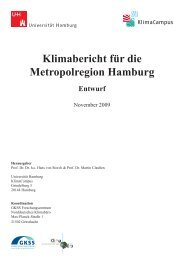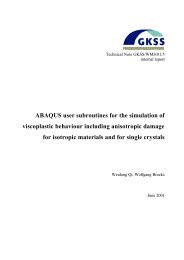Dynamics and Vulnerability of Delta Systems - loicz
Dynamics and Vulnerability of Delta Systems - loicz
Dynamics and Vulnerability of Delta Systems - loicz
You also want an ePaper? Increase the reach of your titles
YUMPU automatically turns print PDFs into web optimized ePapers that Google loves.
economically sustained based on an underst<strong>and</strong>ing <strong>of</strong> the delta dynamics, <strong>and</strong> changes in<br />
controls.<br />
A 21 st Century framework for integrated, multidisciplinary delta management must be developed<br />
to tackle the p<strong>and</strong>emic nature <strong>of</strong> these problems. Organizations such as the Earth System Science<br />
Partnership <strong>and</strong> its Global Water System Project (GWSP), the L<strong>and</strong>-Ocean Interactions in the<br />
Coastal Zone (LOICZ) component <strong>of</strong> the IGBP, the Community Surface <strong>Dynamics</strong> Modeling<br />
System CSDMS, <strong>and</strong> the National Center for Earth-surface <strong>Dynamics</strong> (NCED) advocate here for<br />
a truly multidisciplinary research project to assess dynamics <strong>and</strong> vulnerability <strong>of</strong> deltas, based on<br />
input from different experts, scientists, <strong>and</strong> decision-makers.<br />
We envision development <strong>of</strong> a management strategy towards underst<strong>and</strong>ing <strong>of</strong> human vulnerability<br />
on a global scale consisting <strong>of</strong> two main components:<br />
1. A prototype global database <strong>of</strong> river-delta systems featuring status, scenarios <strong>of</strong> change <strong>and</strong><br />
options for adaptation.<br />
2. A coupled modeling system <strong>of</strong> morphological-ecological process models linked to GIS tools,<br />
which can be applied to scenario modeling.<br />
Key aspects <strong>of</strong> the multidisciplinary approach, research questions for the assessment <strong>of</strong> delta<br />
dynamics <strong>and</strong> vulnerability, <strong>and</strong> challenges for sustainable development, to which the integrated<br />
database <strong>and</strong> subsequent analysis <strong>and</strong> modeling could be applied by geoscientists, environmental<br />
engineers, ecologists, social scientists <strong>and</strong> policymakers alike, are presented in the following<br />
discussion.<br />
4.1 Multidisciplinary Research linked to Practice<br />
For monitoring <strong>and</strong> underst<strong>and</strong>ing change <strong>and</strong> vulnerability in deltas, we suggest a scientific<br />
approach involving both problem-driven research <strong>and</strong> action research. Problem-driven research<br />
means that rather than choosing a disciplinary-based method or a disciplinary perspective for<br />
research, a practical problem is identified <strong>and</strong> research is used for tackling that problem,<br />
irrespective <strong>of</strong> the academic origins <strong>of</strong> the approaches selected. Action research means that the<br />
research helps to catalyze action rather than being for science only, <strong>and</strong> as such have relevance<br />
for the people living on deltas (Chambers 2002).<br />
For example, warning systems for extreme events such as tsunamis or storm surges are <strong>of</strong>ten<br />
seen as a telecommunications engineering concern. Research <strong>and</strong> practice illustrate that they are<br />
more effective for appropriate <strong>and</strong> timely decision-making when they are viewed as a social<br />
process which is part <strong>of</strong> day-to-day living, using telecommunications as one possible approach<br />
amongst many (Glantz 2003, 2004, Gruntfest et al. 1978, Kelman 2006).<br />
Problem-driven action research ensures that the research approach <strong>and</strong> the scientific results are<br />
directly linked to policy <strong>and</strong> practice. Another aspect <strong>of</strong> the method is that for a focused study on<br />
deltas, specific, rather than comprehensive, questions will be addressed across disciplines. Rather<br />
than trying to monitor all data for a specific delta or trying to monitor one parameter for all<br />
deltas, specific questions to address might be for example: “How have different protected area<br />
statuses supported <strong>and</strong> inhibited delta ecosystems?” Such a specific question would assist in<br />
formulating a baseline method for more comprehensive monitoring <strong>and</strong> underst<strong>and</strong>ing change in<br />
deltas.<br />
35





